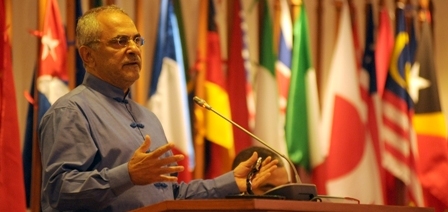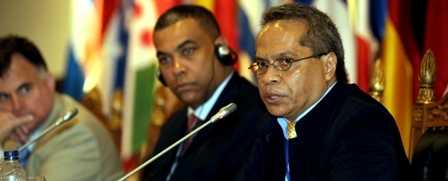Peacebuilding and statebuilding - Interpeace brings the voices of 50 civil society organizations

At the first global meeting of the ‘International Dialogue on Peacebuilding and Statebuilding’, hosted by the Government of Timor-Leste, Interpeace brought the voices of 50 Civil Society Organizations to the International Dialogue Conference in Dili, Timor-Leste.
The International Dialogue meeting provided an opportunity for fragile states to engage in open dialogue and share experiences amongst themselves, with development partners and with civil society on key peacebuilding and statebuilding priorities, the bottle necks and good practice in both national and international support to these areas.
The first day of the meeting was devoted to the presentation by government representatives of the main findings from country consultations conducted in Burundi, Central African Republic, Democratic Republic of Congo, Liberia, Sierra Leone, South Sudan and Timor-Leste. Their discussion identified emerging needs and the challenges faced by their countries, which are considered to be fragile in tackling stability and development. Click here for the country reports and synthesis report.
Fast Talk captured the voices of some 50 Civil Society Organizations
Prior to the conference, Interpeace, an international peacebuilding organization, conducted a rapid consultation called ‘Fast Talk’ to gather the views of some 50 Civil Society Organizations (CSOs) on peacebuilding and statebuilding for use as a discussion piece at the conference. Two thirds of the organizations that participated in the ’Fast Talk’ were Southern based. Organizations were from Africa (West Africa network, Guinea-Bissau, Liberia, Somali Region, Sudan, Gambia, Ethiopia, Kenya, Tanzania, South Africa, Burundi, and DRC); Asia (South East Asia network, Timor-Leste, Fiji, Sri Lanka, Nepal, Pakistan and the Philippines); Latin America (Guatemala, El Salvador and Honduras); Middle East (Israel and Lebanon) and international CSOs supporting peacebuilding and statebuilding efforts and local CSOs around the world.
 Joao Boavida, Executive Director, Centre of Studies for Peace and Development presenting the results of ‘Fast Talk.’ Photo credit: Steve Tickner |
The key observations from the ‘Fast Talk’ are summarized in a background paper and were presented by Joao Boavida, Executive Director, Centre of Studies of Peace and Development (CEPAD), Interpeace’s local partner in Timor-Leste. During the presentation Boavida highlighted three key points:
1. Process matters (and so does context).
The main focus of the International Dialogue Synthesis Report and the country presentations have been on peacebuilding and statebuilding, the priorities, goals and what needs to be done. What is equally important however, and that is often neglected is ‘HOW’ the priorities, the goals and ‘the what’ are translated into reality on the ground. So it is not only the WHAT that is important but also the ‘HOW’. Process matters.
2. Peacebuilding and statebuilding are complementary, but we should not overlook the potential tensions that can arise between the 2 processes.
Statebuilding by nature can be a conflict inducing process. In many post-conflict situations building a State that is the only source of wealth and resources can risk the State being instrumentalized by particular interest groups and can put statebuilding in conflict with peacebuilding.
3. Internal actors need to be drivers of both peacebuilding and statebuilding processes.
However, there is a need to move beyond a government-centric approach to include the wider society in both processes to ensure legitimacy and a broader ownership.
Boavida also added, as a recommendation for moving forward, the International Dialogue may consider:
- involving Civil Society in the Working Groups of the International Dialogue;
- having a Working Group focused on the ‘HOW’ i.e. on PROCESS; and
- including Civil Society as an official member of the International Dialogue
There were 8 official members of Civil Society at the meeting itself with additional CSOs present as observers. CSO representatives were from: Somali Region (Puntland Development Research Centre), Lebanon (Peacebuilding Academy, MENA), Philippines (Initiatives for International Dialogue), Timor Leste (CEPAD/Interpeace) and 4 representatives from international CSOs (Search for Common Ground, Conciliation Resources, International Alert, European Peacebuilding Liaison Office). A serious attempt was made to bring more CSOS from conflict affected countries but this was limited due to visa restrictions and limited amount of time.
Conference Outcomes
- ‘g7+’ group of countries affected by conflict formally created at the conference
A permanent forum of “g7+” (a grouping of countries affected by conflict and fragility including Burundi, the Central African Republic, Chad, the Democratic Republic of Congo, Liberia, Nepal, Sierra Leone, the Solomon Islands, South Sudan and Timor-Leste) formally met. A statement endorsed by the g7+ (see Annex of the Dili Declaration) highlights a set of common priorities and challenges that these countries experience, and expresses the determination to continue working together to achieve a rapid transition to sustainable peace and development. Australia offered to establish a “friends of the g7+” and to work with the International Dialogue Secretariat to set up a mechanism that can enable these meetings to continue. - The Dili Declaration
The International Dialogue meeting culminated with the endorsement of the Dili Declaration – A new vision for peacebuilding and statebuilding. It outlines a plan of commitments by countries considered “fragile”, bilateral and multilateral partners, and civil society to improving how international assistance should support peacebuilding and statebuilding. More importantly it represents “a new vision for state and peacebuilding.” The Declaration identifies the seven peacebuilding and statebuilding priorities (as mentioned above), as stepping stones to achieve progress on development. - An international action plan
The Dili Declaration also outlines a set of short-term actions to begin to move towards these goals and identifies key elements of a work-plan for the Dialogue over the next year. This programme of work should enable the International Dialogue to deliver an International Action Plan on Peacebuilding and Statebuilding to the next High Level Forum in South Korea. The Action Plan will respond to the goals and challenges identified in the national consultations, and will give special attention to four areas:
i) Capacity development;
ii) Aid instruments and financing;
iii) Planning processes for identifying peacebuilding and statebuilding priorities; and
iv) Mechanisms for political dialogue.
Following intensive discussions at the meeting, the Action Plan foresees to include the input of Civil Society representatives into the four working groups that will be created to address the four areas mentioned above.
The Dili Declaration also includes a commitment to feed the results from the meeting into other on-going processes, including the Peacebuilding Commission Review, the implementation of the UN Secretary General’s Report on Peacebuilding, and the Millenium Development Goal Review Summit.























